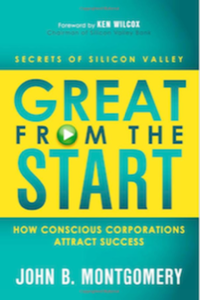Everyone’s heard startup advice about the importance of having a balanced management team. For instance, a tech whiz with no sales skills needs to have a strong salesperson on board to land investors. But a new book argues that startup management teams need a balance not only of job experience and skills, but also in their psychological makeup.
Successful businesses often have one thing in common: The management team has carefully designated roles. These aren’t jobs like CEO, CFO or CIO. They are roles like “the logical one,” “the idea person” or “the touchy-feely guy.”

The 3 Types of Intelligence
John B. Montgomery explores this concept in depth in his new book, Great From the Start: How Conscious Corporations Attract Success. As a Silicon Valley attorney and founder of technology incubator StartWorks, Montgomery has participated in many tech startups and has a natural interest in what makes them succeed. Drawing on the work of organizational development consultant Ward Ashman, Montgomery explains that there are three aspects of human intelligence: logic, emotion and intuition.
Logic is left-brain and process-oriented; intuition is right-brain and systems-oriented; and emotion is feelings-oriented. While every person has logic, intuition and emotion, Ashman’s theory holds that each individual tends to rely primarily on one of those types of intelligence. Understanding which of the three “human intelligences” predominates in your life can give you new insights into why other people respond to you the way they do.
For instance, realizing that logic is your dominant intelligence should help you understand why you sometimes come off as maddening as Star Trek’s Mr. Spock to members of your team. Or knowing that you’re primarily emotional can remind you to display facts and logic when presenting to potential investors. Once you know what type of intelligence you tend to rely on, you can also make a conscious effort to tap into the other aspects of intelligence.

Building a Balanced Leadership Team
Of course, no one is perfectly balanced, no matter how self aware they may be. That’s why creating a team with a balance of human intelligences is so important, Montgomery says. When your management team balances each other, they function as a whole brain, creating a system of checks and balances and to the founder’s preferred mode of intelligence.
Similarly, understanding what modes of intelligence are dominant in your management team can make it easier to work with them. For instance, you’ll realize that the logical person who takes longer to make decisions just wants to know all the facts, so they can think through every option. And that the intuitive person who seems to make snap judgments may be able to grasp the “big picture” faster than most.
Montgomery calls this “whole-brain leadership,” and his attention to the inner workings of the startup founder’s psyche is one of his book’s most valuable aspects. You might not expect a lawyer to talk about topics like mindfulness and meditation, but Montgomery’s experience has taught him the importance of “conscious leadership” in today’s transparent business environment. This requires a clear understanding of your personality, your strengths and weaknesses, and how you come across to others.
Expert Voices
Montgomery’s thoughtful book also pulls in a variety of expert voices to speak on various aspects of building successful companies. His writing mirrors his advice to tech startups: Don’t try to nail everything down from the get-go, be flexible, stay in the present and call in the people with the skills to handle new priorities as they arise.
Great From the Start does present a concise, well-rounded guide to all the basic elements of a successful startup, such as creating a business model, business plan, a strong brand, a good board of directors and a firm legal foundation.
But like the ideal startups he envisions, Montgomery has a larger purpose. Citing research showing that when we work in supportive workplaces, our brains produce neuro-chemicals that make us happy, he claims that “Great From the Start is a preliminary blueprint to design humane corporations that will enable the ultimate paradigm shift: a sustainable global economic system designed for humanity that runs on trust succeeds the prevailing economic system that alternates between hope and fear.”
Techies aren’t known for their emotional intelligence, but startup success depends on engaging others, including investors, employees and customers. That makes Great From the Start’s focus on the human side of business more than just fluff.










